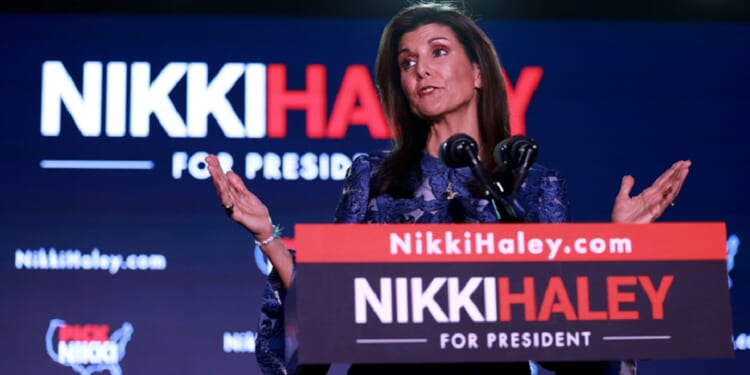Tuesday’s primary in New Hamsphire was supposed to be Nikki Haley’s best chance against Republican front-runner Donald Trump.
The Granite State tends to have a stubbornly independent streak — and, indeed, allows independent voters to cast ballots in the party primary of their choice — and has long been the one potential stumbling block to former President Trump’s veneer of invincibility.
Haley’s polling numbers were strong-ish in the state. So, too, were those of former New Jersey Gov. Chris Christie, the rotund, Trump-seeking missile who dropped out of the race after Iowa — presumably, one assumes, because his poll numbers were abysmal everywhere else and/or it’s difficult to find a good calzone in Concord.
Then businessman Vivek Ramaswamy exited, as did Florida Gov. Ron DeSantis.
So the set up was exactly what Haley wanted: A two-person race between herself and Donald J. Trump. To hear her tell it, New Hampshire was the perfect place to score an upset. It had the potential to be “Rocky.”
Trending:
And it was, in a way. Much like in the first film of the Sylvester Stallone franchise, which featured an upstart challenger taking on the seemingly insurmountable challenge of defeating a champion, the GOP challenger lost.
But that’s where the similarities ended.
Unlike Rocky’s bout with Apollo Creed in the 1976 classic, the outcome of Tuesday’s contest wasn’t particularly close. (The New York Times had it at 54.6 percent for Trump vs. 43.1 percent for Haley as of early Wednesday morning, with 91 percent of the vote in).
It was over early, and there was no moral victory, not with an 11-point KO for the reigning champion.
Should Nikki Haley drop out?
And yet, Haley made it clear she wasn’t throwing in the towel.
“This race is far from over,” she told supporters, according to NBC News. “There are dozens of states left to go, and the next one is my sweet state of South Carolina.”
That “sweet state” might not be very sweet for Haley when the Feb. 24 primary rolls around.
She is considerably further behind in the polls among Republicans than she was in New Hampshire, according to the RealClearPolitics aggregates.
It’s also worth noting that while South Carolina is an open primary state, meaning anyone can vote in the party primary they choose — the state doesn’t even officially recognize voter party affiliation, according to Ballotpedia — Haley’s home state is a lot more conservative and less quirky, election-wise, than New Hampshire is.
And yet, the former South Carolina governor’s New Hampshire shindig was full of belligerent optimism. Quoth The New York Times’ Jazmine Ulloa on the paper’s live-blog, long after the race had been called for The Donald:
“At Nikki Haley’s election watch party, one reason for optimism among attendees keeps coming up: Trump finally feels beatable.”
Yeah, let’s talk about that. Aside from the inexplicability of the statement, one damning stat from NBC News’ exit polling shows why hope shouldn’t spring eternal for Haley supporters — or spring at all, for that matter.
Remember that part earlier — the fact that New Hampshire allows independent voters to vote in whichever primary they choose?
Despite a nominal (if expensive) challenge by Rep. Dean Phillips to President Joe Biden that fell well short of expectations, because apparently progressives don’t want to recognize cognitive decline even when it’s put in front of them on a daily basis, there was no real incentive for liberals who aren’t registered Democrats to vote in Democratic primary. The big ticket was Trump-Haley.
And, as this X post from NBC News’ resident wonk Steve Kornacki noted, New Hampshire Republicans didn’t think Haley was, um, a particularly great Republican standard-bearer:
Per the exit poll, breakdown of NH GOP primary vote by party ID:
Republican: Trump 74-25%
Independent: Haley 61-37%
Democrat: Haley 84-6%— Steve Kornacki (@SteveKornacki) January 24, 2024
The exit poll found that, of the voters in the primary, only 51 percent of them identified as Republican, 43 percent as independent and 6 percent as Democrat. In other words, fully 49 percent of voters in the primary were in groups that overwhelmingly voted for Haley … and she still lost — big — because Republicans favored Trump by 74 percent to 25 percent.
Keep in mind that, generally speaking, New Hampshire is a swing state that leans blue. At the presidential level, no Republican has carried it since George W. Bush in 2000 — and before that, the last Republican to take the state was George H.W. Bush in his 1988 blowout of Michael Dukakis.
Meanwhile, in South Carolina, no Democrat has carried the state since 1976 — and even then, it was because Jimmy Carter, a Georgian whose Baptist faith was well known, had considerable strength among conservative Southern evangelicals.
Furthermore, only one presidential election since 2000 has been closer than 10 points: Barack Obama only lost by nine points to John McCain in 2008.
And among the Haley crowd, Trump … finally feels beatable?
In an evenly divided state where independents make up roughly 40 percent of the electorate, according to The New York Times, and had little reason to vote in the Democrat sideshow, those who identified as independent (61 percent to 37 percent Haley) and those who were Democratic-identifying independents (84 percent to 6 percent Haley) overwhelmingly sided with the challenger — and she still lost by 11 points.
Surely Haley’s campaign team has seen the numbers. There’s no “Rocky 2” in the making, the one where the underdog finally takes down Creed.
Instead, it’s going to go down like late-career Mike Tyson, should she continue down this path: She’s going to keep losing embarrassing fights to Trump until, to use Tyson’s infamous malapropism, she fades into “Bolivian.”
At least Tyson was taking home big promoter paychecks for those embarrassments.
In Haley’s case, she’s wasting big donor paychecks in pursuit of a nomination she’ll never get.
Instead of fostering punch-drunk hallucinations that Tuesday’s result meant “Trump finally feels beatable,” Haley should instead borrow the wise words of another pugilist after the decisive New Hampshire beatdown: No más.


